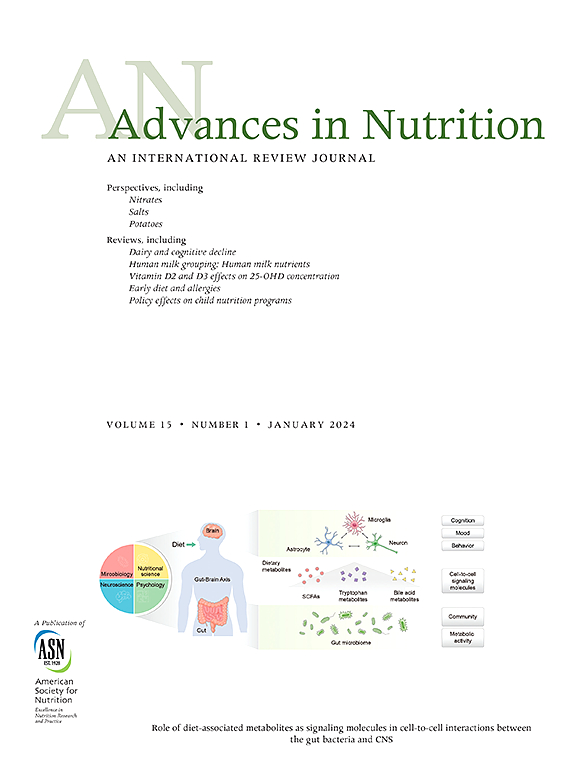地中海饮食、精液质量和男性医疗辅助生殖结果:系统回顾和荟萃分析
IF 9.2
1区 医学
Q1 NUTRITION & DIETETICS
引用次数: 0
摘要
背景:环境污染、久坐不动的生活方式和不健康的饮食模式被假设为人类精液质量下降的主要可改变因素。目的:评估先天定义的地中海饮食(MedDiet)依从性与男性精液质量参数或医学辅助生殖(MAR)结局之间的关系。方法:对截至2024年10月的PUBMED、EMBASE或SCOPUS数据库中的研究进行系统评价。先验定义的MedDiet依从性被认为是暴露和常规精液质量参数作为主要结局。次要结局包括MAR结局、生殖激素水平和精子DNA断裂。使用NHLBI工具进行质量评估。meta分析遵循Cochrane指南进行。对健康参与者和来自生育诊所的参与者分别进行了亚组分析。进行敏感性分析以检查有影响的研究。结果:对11篇符合条件的文章(n= 2558人)进行了定性分析。9项观察性研究的数据显示,坚持MedDiet与精液量(1/9)、精子浓度(5/9)、计数(5/9)、总运动性(5/9)、进行性运动性(4/9)、活力(1/9)、正常形态(2/9)或促卵泡激素(1/9)呈正相关。在这些研究中,只有一项研究前瞻性地探讨了MedDiet依从性和MAR结果之间的联系,该研究报告没有关联。共有8项研究符合荟萃分析(n=1,835人)。总MedDiet依从性与精子数量呈显著正相关(24.37 M spz;1.30 ~ 47.44, I2=89%),总运动性(8.81%;2.26 ~ 15.37, I2=88%),进行性运动(7.49%;1.47 ~ 13.50, I2=86%)和正常形态(1.02%,0.21 ~ 1.82,I2=77%)。两项评估MedDiet对精液参数影响的随机临床试验的证据与主要结果一致。结论:来自观察性研究和临床试验的证据表明,坚持MedDiet在精液质量参数方面有潜在的益处,但在生育结果方面没有。意义声明:这篇SRMA是最新的,也是第一篇关于先验MedDiet对男性精液质量和医学辅助生殖结果的特定关联的文章,包括最新的随机对照试验和观察性研究的荟萃分析数据。本文章由计算机程序翻译,如有差异,请以英文原文为准。
Mediterranean Diet, Semen Quality, and Medically Assisted Reproductive Outcomes in the Male Population: A Systematic Review and Meta-Analysis
Environmental pollution, sedentary lifestyles, and unhealthy dietary patterns have been hypothesized as the main modifiable factors of human semen quality decline. The study aimed to assess the associations between an a priori-defined Mediterranean diet (MedDiet) adherence and semen quality parameters or medically assisted reproductive (MAR) outcomes in males. A systematic review was conducted with studies from PubMed, Embase, or Scopus databases until October 2024. A priori-defined MedDiet adherence was considered as exposure and conventional semen quality parameters as the primary outcomes. Secondary outcomes included MAR outcomes, reproductive hormone concentrations, and sperm DNA fragmentation. A quality assessment was performed using the NHLBI tool. Meta-analysis was conducted following Cochrane guidelines. A subgroup analysis was done for healthy participants and those from fertility clinics separately. A sensitivity analysis was performed to check the influential studies. A qualitative analysis was performed on 11 eligible articles (n = 2558 individuals). Data from 9 observational studies showed a positive association between the adherence to MedDiet and semen volume (1/9), sperm concentration (5/9 studies), count (5/9), total motility (5/9), progressive motility (4/9), vitality (1/9), normal morphology (2/9), or follicular stimulating hormone (1/9). Among these, the links between MedDiet adherence and MAR outcomes were prospectively explored only in 1 study, which reported no association. A total of 8 studies were eligible for meta-analysis (n = 1835 individuals). Total MedDiet adherence showed a significant positive association with sperm count (24.37 M spz.; 1.30–47.44; I2 = 89%), total motility (8.81%; 2.26–15.37; I2 = 88%), progressive motility (7.49%; 1.47–13.50; I2 = 86%), and normal morphology (1.02%; 0.21–1.82; I2 = 77%). Evidence from 2 randomized clinical trial evaluating the effect of MedDiet on semen parameters aligns with the primary results. Evidence from observational studies and clinical trials shows potential benefit of adhering to a MedDiet in terms of seminal quality parameters, but not fertility outcomes.
This study was registered at PROSPERO as CRD42024584003.
求助全文
通过发布文献求助,成功后即可免费获取论文全文。
去求助
来源期刊

Advances in Nutrition
医学-营养学
CiteScore
17.40
自引率
2.20%
发文量
117
审稿时长
56 days
期刊介绍:
Advances in Nutrition (AN/Adv Nutr) publishes focused reviews on pivotal findings and recent research across all domains relevant to nutritional scientists and biomedical researchers. This encompasses nutrition-related research spanning biochemical, molecular, and genetic studies using experimental animal models, domestic animals, and human subjects. The journal also emphasizes clinical nutrition, epidemiology and public health, and nutrition education. Review articles concentrate on recent progress rather than broad historical developments.
In addition to review articles, AN includes Perspectives, Letters to the Editor, and supplements. Supplement proposals require pre-approval by the editor before submission. The journal features reports and position papers from the American Society for Nutrition, summaries of major government and foundation reports, and Nutrient Information briefs providing crucial details about dietary requirements, food sources, deficiencies, and other essential nutrient information. All submissions with scientific content undergo peer review by the Editors or their designees prior to acceptance for publication.
 求助内容:
求助内容: 应助结果提醒方式:
应助结果提醒方式:


